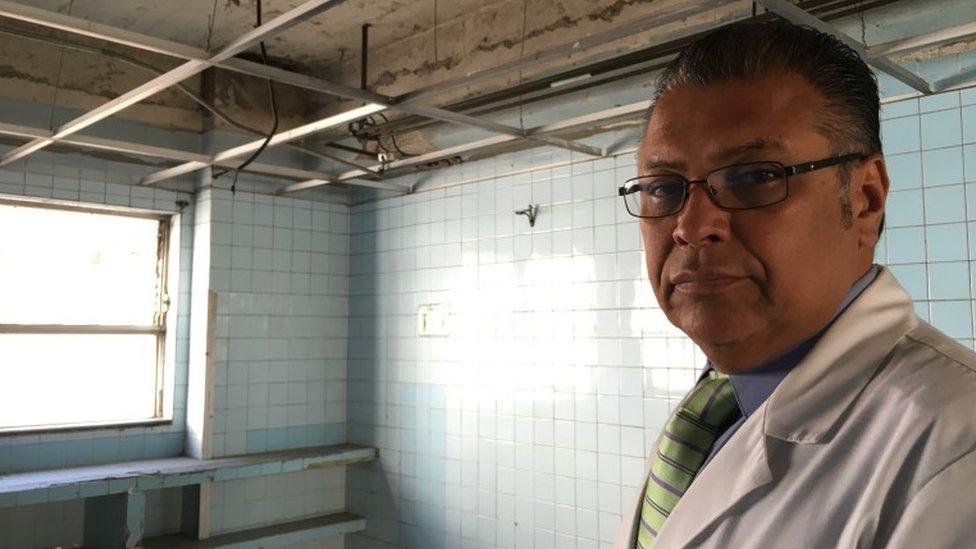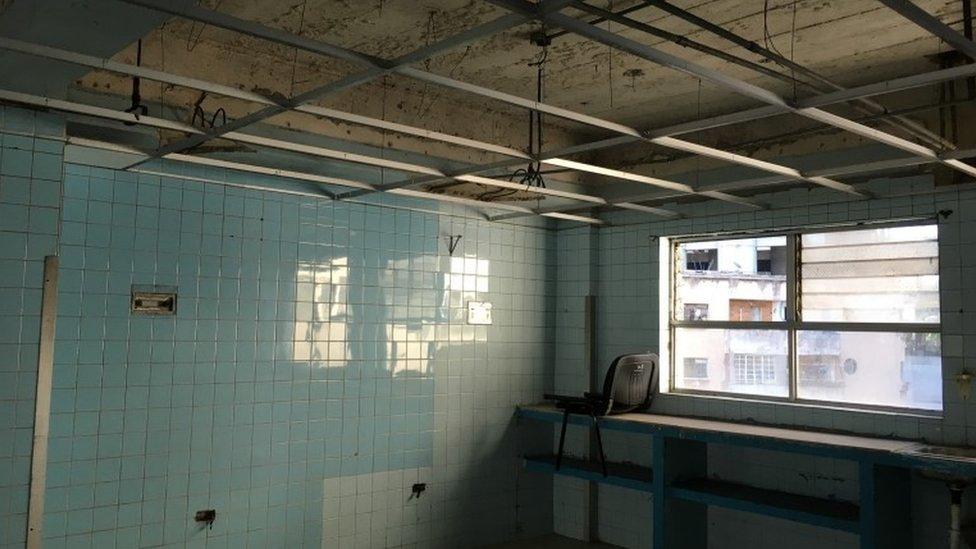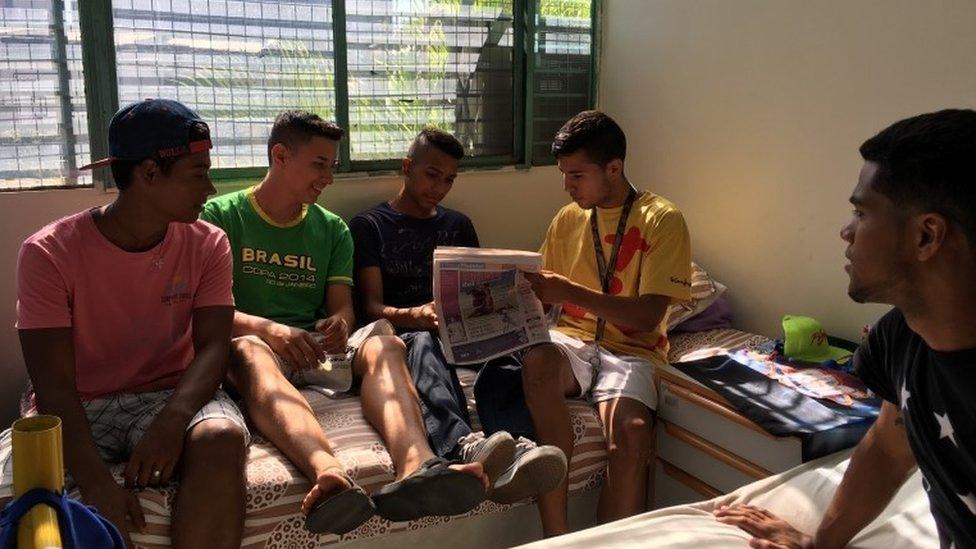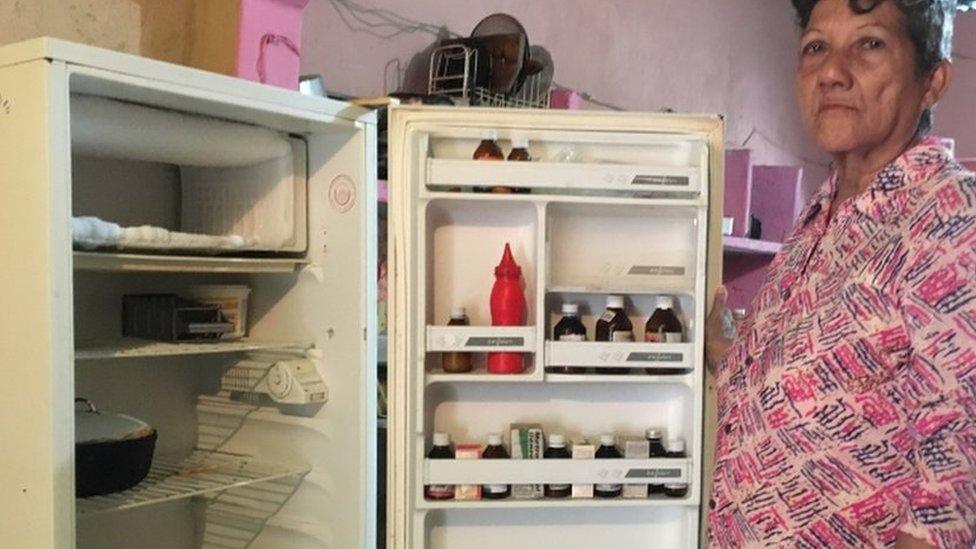Venezuela crisis: Caracas hospital shows sorry state of health system
- Published
The Caracas children's hospital struggles to give proper care to Alexander, 11
"This is like a medical facility in a war zone," says Huniades Urbina-Medina, describing the Jose Manuel de Los Rios children's hospital in the Venezuelan capital, Caracas.
"This used to be the best hospital, not just in the country, but in all of Latin America. We used to welcome patients from all over the region. And look at it now."
As he walks through the building, Dr Urbina-Medina points to the peeling paintwork, the exposed pipes and electricity cables.
"This isn't what a hospital should be, he says, it looks more like a building site."
Venezuela's economic crisis has hit the country hard and the health care system is crumbling.
As politicians argue over the rights and wrongs of recalling President Nicolas Maduro, doctors and nurses are struggling to cope.
"We don't have enough drugs to treat the sick," explains Dr Urbina-Medina as he points to the empty shelves in the hospital pharmacy.
"Five years ago, we had an average of 200 patients waiting to be operated on. At the last count, there were more than 5,500 names on the waiting list. We have nine operating rooms, but, today, only four are fully functional."

Despite his decrepit facilities, Dr Urbina-Medina is determined to stay in Venezuela
In one of the few wards that can can still be used, a young child lies listless on the bed, his mother by his side. He is called Alejandro and is 11 years old, but he looks half that age.
He has meningitis. His oversized skull bears witness to the tell-tale signs of hydrocephaly. His eyes are gaunt, he is painfully thin.
His body cannot fight the disease. It is weakened by malnutrition. Alejandro has been here for 12 days. His mother does not know how long his ordeal will last, his agony prolonged by the shortages of medicine.
But doctors are doing all they can to keep him comfortable.
Nutrition emergency
"Venezuela has the highest rate of teenage pregnancies in the world," says Maritza Landaeta of the Fundacion Bengoa, an NGO which works in poor communities affected by malnutrition.

The outpatient ward at Jose Manuel de Los Rios hospital has seen better days
"Many babies have a high chance of dying.
"Young mothers can't find the powdered milk and basic nutrients needed to guarantee their children's wellbeing. The shops are empty. Instead of milk, children are being fed with the water used for cooking potatoes or rice. We're now seeing an increasing number of children showing symptoms of starvation," says Ms Landaeta.
She has worked in this field for close to 40 years. She is a trained paediatrician and she's never seen a situation as bad as this before.
So who is to blame? She points a finger at the government, accused of taking measures to control the production, the distribution and the access to food.
"It isn't working," she says, "funds are going missing, there are food shortages, the authorities aren't doing their job.
"The state has to understand that this is a nutrition emergency."
Asked if children are dying because of political mismanagement and corruption, Maritza Landaeta sighs wearily and, with an air of resignation, says: "Yes."
Deaf ears
In the heart of Caracas, behind high walls and a locked gate and almost hidden from view, there is a place of refuge for young Venezuelans hoping to escape poverty.
The Casa Don Bosco foster home is one of 86 such institutions across the country. It welcomes about 30 children, mostly adolescents.
"More and more children being put in foster homes because their families simply can't cope," says its director, Leonardo Rodriguez Angola, who holds up an official document.

Casa Don Bosco is home to 30 children whose families cannot look after them
"This is a request for us to take in three brothers, aged 13, 11 and eight. They live in poverty. Their mother has four other children."
Mr Rodriguez has been pleading with the government to get more help, but his appeals have fallen on deaf ears. "When we petition the authorities, they just laugh at us," he explains.
"Three years ago, the government created a new ministry of supreme social happiness. I thought that minister would help us. But when we went to ask for money to buy food, she replied that we had to ration what we had, adding: 'The whole country is on a diet.' The government wants to make the issue of poverty and hunger 'invisible'."
Staying on
At the Jose Manuel de Los Rios children's hospital, Dr Urbina-Medina is continuing his rounds.
He comes across a room piled high with beds and monitors. Nothing works. Laughing, he says: "We call this our cemetery for medical equipment."
He's putting on a brave face, but he knows that the situation is desperate.
Huniades Urbina-Medina is four years away from retirement, he has received offers to work at other hospitals abroad.
Has he never been tempted to leave?
His answer is emphatic: "I want to stay here, our patients need our help. Life is tough, but I won't give up!"
- Published7 October 2016
